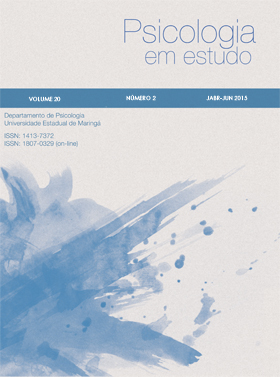RELAÇÕES DE GÊNERO E CONHECIMENTO EM PSICOLOGIA: CONTRIBUIÇÕES DA TEORIA CRÍTICA
Résumé
Este trabalho apresenta algumas discussões recentes levantadas pela teoria crítica feminista, que contribuem para problematizar a objetividade científica da psicologia. Denuncia-se, primeiramente, falsa neutralidade de gênero que, embutida na ideia de um ser humano genérico, conduz a uma necessária revisão de conceitos supostamente universais. Um desses conceitos é aquele de justiça, que permeia estudos sobre moral em psicologia do desenvolvimento. Ao mesmo tempo, discute-se a predominância de determinado gênero nas universidades, instituindo e legitimando experiências específicas no processo de construção de conhecimentos na área. Exploram-se artigos de autoras feministas identificadas com o campo teórico-crítico, com foco na questão da identidade, bem como nas implicações políticas das concepções de linguagem envolvidas em suas posições. Por fim, dialogando-se com autores da primeira geração da escola de Frankfurt, propõe-se a consideração da dialética entre conceito e experiência para a construção de novos saberes e estratégias visando à igualdade de gênero. Espera-se mostrar que a crítica feminista atingiu pilares importantes da psicologia, que, como ciência, não pode permanecer inerte frente aos desafios que lhe vêm sendo colocados. Os diversos campos da psicologia precisam se mobilizar na construção de estratégias emancipatórias, capazes de assegurar a própria validade dos conhecimentos produzidos pela área.Téléchargements
Références
Adorno, T.W. (2001). Kant’s critique of pure reason (R. Tiedemann, ed., R. Livinstone, trans.). Stanford, CA: Stanford University Press.
Beauvoir, S. (1970). O segundo sexo: fatos e mitos. (Milliet, S., trad). São Paulo: Difel.
Benhabib, S. (1991). O outro generalizado e o outro concreto: a controvérsia Kohlberg-Gilligan e a teoria feminista. In Benhabib, S. & Cornell, D. Feminismo como crítica da modernidade. Rio de Janeiro: Ed. Rosa dos Tempos.
Borges, L.S., Canuto, A.A.A., Oliveira, D.P. & Vaz, R.P. (2013). Abordagens de gênero e sexualidade na Psicologia: revendo conceitos, repensando práticas. Psicologia: ciência e profissão, 33 (3), 730-745.
Butler, J. (2003). Problemas de gênero: feminismo e subversão da identidade. Rio de Janeiro: Civilização Brasileira.
Cohen, J. L. (2012). Repensando a privacidade: autonomia, identidade e a controvérsia sobre o aborto. Revista brasileira de Ciência Política, 7, 165-203.
Fraser, N. (2001). Da redistribuição ao reconhecimento: dilemas da justiça na era pós socialista. In Souza, J. Democracia hoje: novos desafios para a teoria democrática contemporânea. Brasília: Ed. UnB.
Gesser, M., Oltramari, L.C., Cord, D. & Nuernberg, A.H. (2012). Psicologia Escolar e formação continuada de professores em gênero e sexualidade. Revista semestral da Associação brasileira de Psicologia Escolar e Educacional. 16 (2), 229-236.
Habermas, J. (2012). Teoria do agir comunicativo. São Paulo: Martins Fontes.
Heller, A. (2009). A theory of feelings. Lanham, MD: Rowman & Littlefield.
Honneth, A. (2003). Luta por reconhecimento: a gramática moral dos conflitos sociais. São Paulo: Ed.34.
Kant, I. (2012). Crítica da razão pura (F.C. Mattos, trad., 2a. ed.). Petrópolis, RJ: Vozes.
Kerner, I. (2012). Tudo é interseccional? sobre a relação entre racismo e sexismo. Revista Novos Estudos, 93, 45-58.
Melo, R.A. & Barreto, D.J. (2014). Formação em Psicologia: discursos e saberes sobre experimentações de Gênero. Psicologia: ciência e profissão, 34 (3) , 676-689.
Okin, S. M. (2008). Gênero, o público e o privado. Estudos Feministas, 16 (2), 305-332.
Portugal, F.T., & Jacó-Vilela, A.M. (Orgs.). (2012). Clio-Psyché: gênero, psicologia, história. Rio de Janeiro: NAU Editora.
Safatle, V. (2016, 1 de janeiro). Sem perspectiva, Folha de São Paulo, Acessado em 17 de fevereiro de 2016, de http://www1.folha.uol.com.br/colunas/vladimirsafatle/2016/01/1724843-sem-perspectiva.shtml
Silva, F. G. (2008). Iris Young, Nancy Fraser e Seyla Benhabib: uma disputa entre modelos críticos. In Nobre, M. Curso livre de teoria crítica. Campinas-SP: Papirus.
Young, I. M. (2001) Comunicação e o outro: além da democracia deliberativa. Souza, J. (Org.) Democracia hoje: novos desafios para a teoria democrática contemporânea. Brasília: Ed. UnB.
As opiniões emitidas, são de exclusiva responsabilidade do(s) autor(es). Ao submeterem o manuscrito ao Conselho Editorial de Psicologia em Estudo, o(s) autor(es) assume(m) a responsabilidade de não ter previamente publicado ou submetido o mesmo manuscrito por outro periódico. Em caso de autoria múltipla, o manuscrito deve vir acompanhado de autorização assinada por todos os autores. Artigos aceitos para publicação passam a ser propriedade da revista, podendo ser remixados e reaproveitados conforme prevê a licença Creative Commons CC-BY.
The opinions expressed are the sole responsibility of the author (s). When submitting the manuscript to the Editorial Board of Study Psychology, the author (s) assumes responsibility for not having previously published or submitted the same manuscript by another journal. In case of multiple authorship, the manuscript must be accompanied by an authorization signed by all authors. Articles accepted for publication become the property of the journal, and can be remixed and reused as provided for in theby a license Creative Commons CC-BY.
















